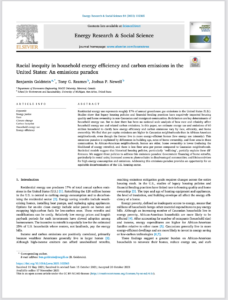Full Title: Racial Inequity in Household Energy Efficiency and Carbon Emissions in the United States: An Emissions Paradox
Author(s): Benjamin Goldstein, Tony G. Reames, Joshua P. Newell
Publisher(s): Energy Research & Social Science
Publication Date: November 17, 2021
Full Text: Download Resource
Description (excerpt):
Residential energy use represents roughly 17% of annual greenhouse gas emissions in the United States (U.S.). Studies show that legacy housing policies and financial lending practices have negatively impacted housing quality and home ownership in non-Caucasian and immigrant communities. Both factors are key determinants of household energy use. But to date there has been no national scale analysis of how race and ethnicity affect household energy use and related carbon emissions. In this paper, we estimate energy use and emissions of 60 million household to clarify how energy efficiency and carbon emissions vary by race, ethnicity, and home ownership. We find that per capita emissions are higher in Caucasian neighborhoods than in African-American neighborhoods, even though the former live in more energy-efficient homes (low energy use intensity). This emissions paradox is explained by differences in building age, rates of home ownership, and floor area in these communities. In African-American neighborhoods, homes are older, home ownership is lower (reducing the likelihood of energy retrofits), and there is less floor area per person compared to Caucasian neighborhoods. Statistical models suggest that historical housing policies, particularly “redlining”, partially explain these differences. We suggest three policies to address this emissions paradox: Government financing of home retrofits, particularly in rental units; Increased access to photovoltaics in disadvantaged communities; and Disincentivizes for high energy consumption and emissions. Addressing this emissions paradox provides an opportunity for an equitable decarbonization of the U.S. housing sector.
